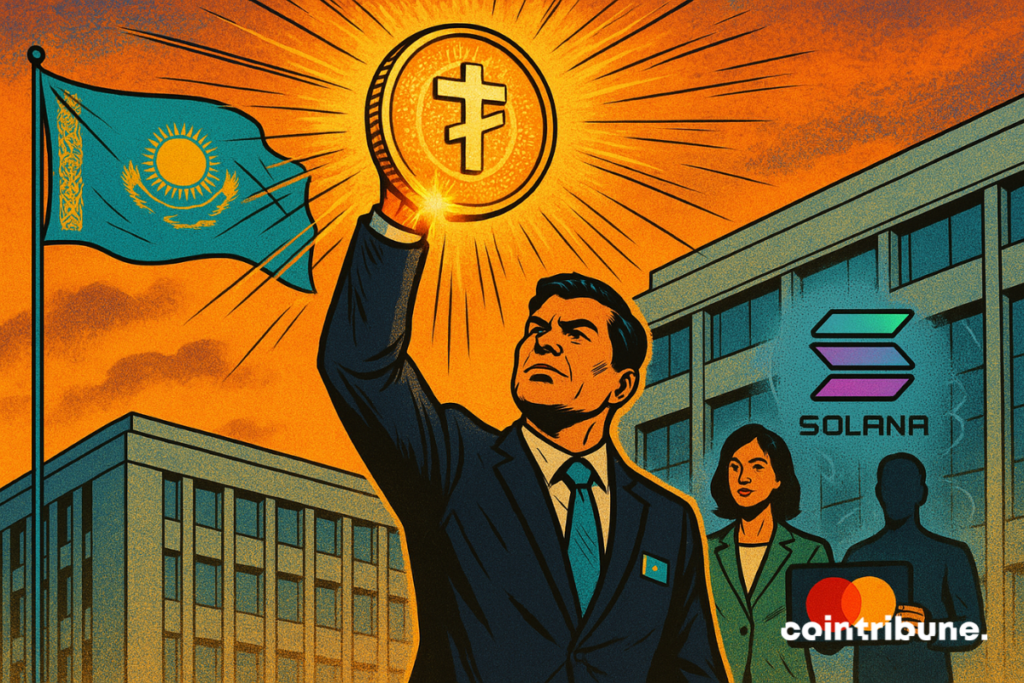Kazakhstan’s Central Bank Makes Bold Move: National Stablecoin Launches on Solana Blockchain
Central Asia's financial landscape just got a digital upgrade—Kazakhstan's central bank is rolling out a state-backed stablecoin using Solana's lightning-fast infrastructure.
The Tech Behind the Move
Solana's high-throughput network—capable of processing 65,000 transactions per second—beats traditional banking systems by miles. No more waiting days for settlements when Kazakhstan's digital tenge moves at blockchain speed.
Why This Changes Everything
This isn't just another crypto experiment. A national bank adopting Solana signals mainstream validation for blockchain scalability. They're bypassing slower legacy systems entirely—imagine cross-border payments settling in seconds instead of weeks.
The Cynical Take
Of course, traditional bankers will call this reckless—until they start losing business to faster, cheaper digital alternatives. Funny how innovation suddenly becomes 'responsible' once it threatens their fee structures.
Kazakhstan's move proves that when it comes to modern finance, even central banks recognize that building on yesterday's technology is like bringing a horse to a hyperloop race.
 Read us on Google News
Read us on Google News
In brief
- The Evo stablecoin is launched in a sandbox under the supervision of the National Bank of Kazakhstan.
- Solana provides the blockchain infrastructure, chosen for its speed and low operational costs.
- Mastercard acts as an intermediary between Evo and other stablecoin issuers worldwide.
- The project aims to link crypto, traditional finance, and digital inclusion within a legal framework.
When the Central Bank Moves from Regulator to Institutional Builder
The Evo stablecoin marks an unprecedented step in the traditional role of a central bank. Led by the, this project does not just oversee innovation – it drives it from its regulatory sandbox. The partners are Intebix (crypto exchange) and Eurasian Bank. The National Bank provides the legal framework that allows the issuance and testing of the KZTE, backed by the tenge.
According to, founder of Intebix: ” This is still the first case where the central bank plays a proactive role in stablecoin issuance “.
Governorstated:
Today, we launch, within the National Bank’s regulatory sandbox format, the first Kazakh stablecoin, denominated in our national currency, the tenge. The modern world is experiencing a period of digital transformation, which comes with challenges but, above all, an immense number of opportunities. Digital assets and blockchain technologies hold a special place here. They open new perspectives for the development of financial services, the improvement of financial inclusion, the creation of innovative products, and, overall, the advancement of our country
This shift from the shadows to center stage signals a new governance pact. Kazakhstan no longer just authorizes crypto-activity: it directs, structures, and integrates it into its national monetary ambitions. This institutionalization reassures. It balances innovation and sovereignty.
Solana, Mastercard, and the Technological Bet of a Crypto-Friendly Stablecoin
Choosingto host Evo is no accident. This blockchain is fast, inexpensive, and optimized for scalability. It adapts to micropayments and daily use, for both individuals and businesses. An ideal base for a stablecoin with a national, even transnational, vocation.
, for its part, opens connections with other stablecoin issuers. This strategy makes Evo compatible with global payment standards. A lever for mass adoption, without bypassing banks.
Five Key Benchmarks
- 13%: global share of Bitcoin hashrate attributed to Kazakhstan in 2022.
- 1:1: parity of the Evo stablecoin with the Kazakh tenge.
- Solana: the blockchain chosen for its speed and energy efficiency.
- Sandbox: regulatory zone allowing experimentation without excessive constraints.
- November 2023: official launch of the digital tenge (CBDC).
This technological duo acts as a backbone for the country’s digital ecosystem. By aligning crypto and banking infrastructure, Kazakhstan demonstrates that a state can shape its own trajectory in decentralized finance without compromising stability or sovereignty.
At the beginning of September, Kazakhstan officially announced the creation of a national crypto reserve. This announcement perfectly complements the Evo stablecoin strategy. The country no longer bets timidly on the sector: it engages with method. Like other wise nations before it, it seems determined to turn this trial into a model.
Maximize your Cointribune experience with our "Read to Earn" program! For every article you read, earn points and access exclusive rewards. Sign up now and start earning benefits.

